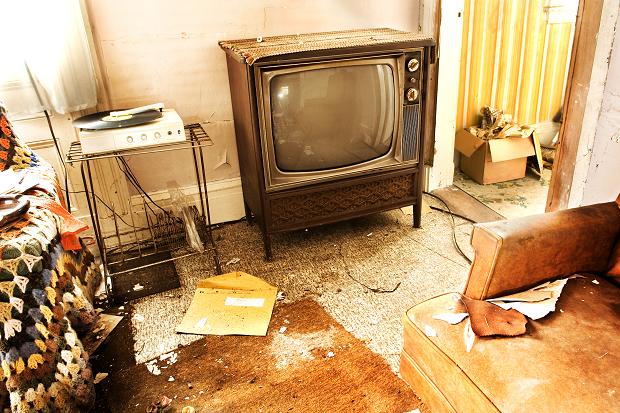
When Tyko and I moved to the South Bronx seven years ago, we unwittingly became gentrifiers.
It’s hard to think of ourselves that way, but in reality that’s what we are. We are people who have moved into a poor neighborhood, not because we must, but because we can.
All of our married lives we’ve lived in poor neighborhoods, not to make a political statement and not to make a financial killing as the neighborhood gentrifies, but because it seemed like a financially smart thing to do. Affordable and convenient housing.
Poor neighborhoods we lived in in Ohio and Pennsylvania didn’t change much while we lived there. I guess we didn’t provide much of an upscale draw.
The South Bronx is Gentrifying
But here, in the South Bronx, the changes are taking place fast and furious.
Our building was the first renovated factory building to offer market rate condos. And once all of those units sold quickly, the neighborhood started changing right in front of our eyes.
Scaffolding went up on buildings. Construction started in vacant lots. Press articles about developers plans for upscale housing popped up in the papers it seemed every month. Gentrification. A bit unsettling, but with the likely upside of providing us with a coffee shop, a few more restaurants and higher value for our condo.
I didn’t think much about the deeper and more distressing aspects of gentrification until last week when I met with my friend Clemetin’s case worker — the woman whose nonprofit program holds the lease on his apartment. And she connected the dots for me.
“We’re having trouble,” she said, “getting the management of Clemetin’s building to do what they should. Because people who can afford much higher rents are moving into the South Bronx, and the building management would like to get the subsidized tenants out.”
If they do force out people like Clemetin, they can renovate and rent the same apartments for much more money. There’s a market now.
The Real Life, Horrifying Consequences of Gentrification
Here’s what happens…
It’s not easy in New York City to get rid of tenants. Once you have an apartment, if you pay the rent and obey the law, you have a right to stay.
So what’s the strategy?
Don’t take care of maintenance problems in the apartments.
If you’ve been reading this blog for a while, you’ll remember my friend Clemetin who spent nearly 30 of his 50 years in prison. Much of that in solitary. Though over the six years that he’s been out, his coping skills have improved, he lives on the edge of being stable. And it still doesn’t take much to get him riled up.
So several months ago, when the ceiling in his ground floor apartment developed a leak with a steady drip drip drip, he was upset. I suggested that he go to the building management and report the problem. He did, but got no response.
After a while, the water started draining down through the electrical fixture in the hall. Concerned, he once again went to the management. Again, no response. This time Clemetin called the Fire Department. Firemen came, saw the problem and switched off the fuse. Now he had dripping water and no light in the hall.
Clemetin called his case worker. The case worker called the apartment management, but again, no response.
Over the next several weeks, the ceiling got soggy and started to sag. Messy, moldy wall board hanging down and water puddles on the floor.
More calls. Finally, someone came and took down a large square part of the ceiling. Still drips, still no light, and now a big, unsightly hole in the ceiling.
And then, this week, just when I thought it was as bad as it could get, the crowning blow. Out of the hole in the ceiling jumps… yes… a big New York City rat — right into Clemetin’s apartment.
Clemetin went haywire. He found a shovel and attacked the rat which then crawled behind the refrigerator where he (or she) died.
Drip drip drip, no light, hole in ceiling, dead stinky rat. And no help from anyone.
Forcing People Out Through Negligence
I suspect that the building management hopes that if things get bad enough, Clemetin will move out. Then they’ll refurbish the apartment, fix the drip, repair the ceiling, and yes get rid of the rats. And, of course, rent it to the next gentrifying family looking for a nice apartment in the South Bronx.
Sounds like a crazy, trumped up story, I know. And I wish I could tell you it was. But it’s the all too real very dark side of gentrification. And people like my friend Clemetin who have no money and no clout and no way to fight the system are on the very short end of that gentrification stick.
The management may have succeeded. Clemetin’s apartment is uninhabitable.
Even if you weren’t tightly wired like Clemetin, you wouldn’t want to stay in an apartment with no light, dripping water and the possibility of rats jumping onto your bed.
Me? I’m doing my best to talk with his case worker to find a solution. But so far, I haven’t managed to make any impact at all. She no longer returns my calls. And when Clemetin calls me, I have no ready solution to this problem.
Even if I was willing to hire a plumber to fix the leak and a carpenter to repair the ceiling and a painter to make the place look good again (and yes, someone to remove the rat), they would need the approval and cooperation of the management company.
And that, my friends, is what happens to poor people when the rich come to town. The slim threads that hold their lives together are torn asunder. And most of us rich people don’t even know it.
Imagine Being in this Situation — What Would You Do?
With all my social and financial privilege, I feel quite helpless. If you were in my situation and wanting to help Clemetin, what would you do? What ideas do you have that might solve these problems?
People like Clemetin have enough problems and struggles just getting through the day. The consequences of gentrification should not be another.
Please share your thoughts, either privately with me through an email, in the comments below or leave a comment on my Facebook page.
Perhaps you can help me find the best way forward.
